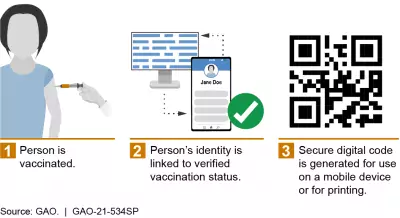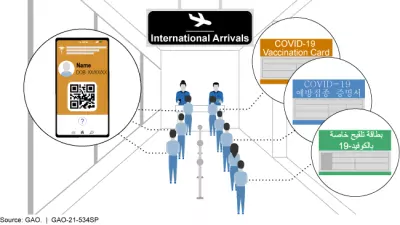Want Proof of Your COVID-19 Vaccination? An App Could Be Coming
As more people get vaccinated against COVID-19, some countries are beginning to use digital vaccine credentials, or passports, to confirm whether a person has been vaccinated, tested negative for COVID-19, or recovered from it.
Digital vaccine credentials could support more efficient travel but also raise concerns about data privacy. While these credentials are not currently in wide use in the United States, the opportunities and challenges they present are worth a closer look.
Today’s WatchBlog post explores the ins and outs of digital vaccine credentials.
How do digital vaccine credentials work?
To get a digital vaccine credential, individuals would download an app onto their mobile device, create an account, and link it to their COVID-19 vaccination record from an immunization registry or to a COVID-19 test result from a certified test laboratory. The below figure is a simplified illustration of how a digital vaccine credential is created.
Image

The app would then generate a secure digital code that confirms the user’s identity and COVID-19 health information. Use of digital credentials at airports could make departure and arrival procedures faster and more efficient for travelers, airlines, and border officials compared to review and verification of paper vaccine cards in different languages (see the figure below).
Image

What makes digital vaccine credentials useful?
This technology could offer a variety of benefits, including safer and more efficient travel. Contactless scanning of digital credentials can minimize long lines and overcrowding at airports, reducing the risk of transmission and cutting down on the time it takes to check each person’s vaccination or test record. In contrast, verifying paper vaccine cards and test results in different languages has caused overcrowding at some international airports, even at currently reduced passenger levels.
Digital vaccine credentials can also be more difficult to falsify than paper vaccine cards and can use technologies to help secure personal information.
What challenges do these tools present?
Because the technology is so new, one challenge associated with digital vaccine credentials is a lack of clear standards for how personal health information is used and protected. Without clear standards, especially for minimizing collection of personal information, the technology can undermine the security and privacy of users’ health data.
Further, a widespread use of the technology may exacerbate inequalities or constrain freedom of movement for those who do not have access to vaccines, cannot be vaccinated for health or age reasons, or do not own a mobile device.
What’s next?
While the European Union is hoping to use digital vaccine credentials during the summer 2021 travel season, consideration of this technology is still in early stages in the United States.
To learn more about digital vaccine credentials and the opportunities and challenges they present, check out our new Science & Tech Spotlight.
- Comments on GAO’s WatchBlog? Contact blog@gao.gov.
GAO Contacts
Related Products

GAO's mission is to provide Congress with fact-based, nonpartisan information that can help improve federal government performance and ensure accountability for the benefit of the American people. GAO launched its WatchBlog in January, 2014, as part of its continuing effort to reach its audiences—Congress and the American people—where they are currently looking for information.
The blog format allows GAO to provide a little more context about its work than it can offer on its other social media platforms. Posts will tie GAO work to current events and the news; show how GAO’s work is affecting agencies or legislation; highlight reports, testimonies, and issue areas where GAO does work; and provide information about GAO itself, among other things.
Please send any feedback on GAO's WatchBlog to blog@gao.gov.




